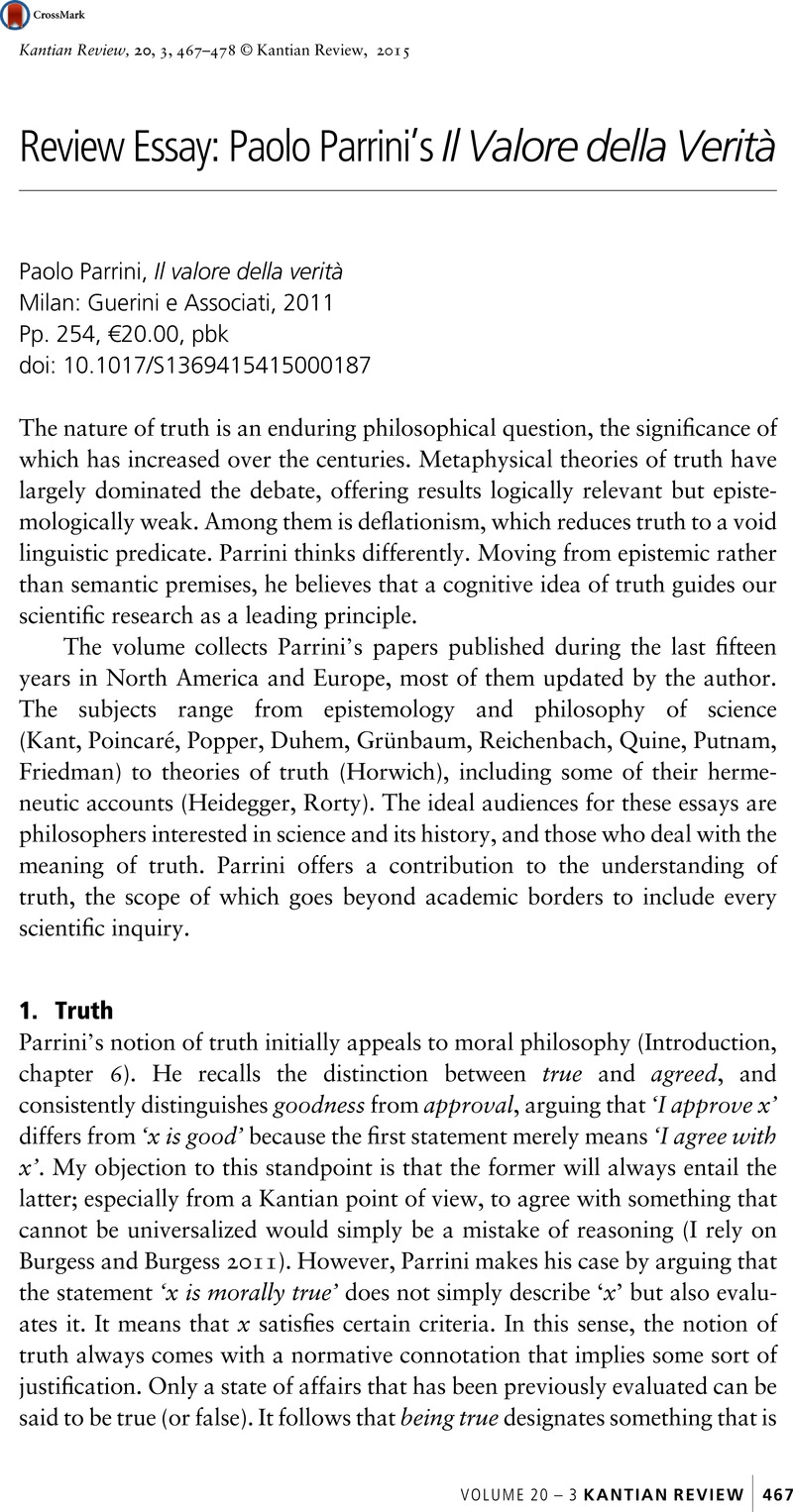No CrossRef data available.
Article contents
Review Essay: Paolo Parrini’s Il Valore della Verità - Paolo Parrini, Il valore della veritàMilan: Guerini e Associati, 2011 Pp. 254, €20.00, pbk
Review products
Paolo Parrini, Il valore della verità Milan: Guerini e Associati, 2011 Pp. 254, €20.00, pbk
Published online by Cambridge University Press: 08 October 2015
Abstract
An abstract is not available for this content so a preview has been provided. Please use the Get access link above for information on how to access this content.

- Type
- Review Essay
- Information
- Copyright
- © Kantian Review 2015
References
Allison, Henry (2004) Kant’s Transcendental Idealism. New Haven: Yale University Press.CrossRefGoogle Scholar
Brandom, R (1983) ‘Heideggerʼs Categories in Being and Time’. The Monist, 66, 387–409.CrossRefGoogle Scholar
Burgess, Alexis G., and John P., Burgess (2011) Truth. Princeton: Princeton University Press.CrossRefGoogle Scholar
Carrier, Martin (1994) The Completeness of Scientific Theories. Dordrecht: Kluwer.CrossRefGoogle Scholar
Duhem, Pierre ([1906] 1954) The Aim and Structure of Physical Theory. Princeton: Princeton University Press.Google Scholar
Friedman, Michael (1983) Foundations of Space-Time Theories. Princeton: Princeton University Press.Google Scholar
Grünbaum, Adolf (1968) Geometry and Chronometry in Philosophical Perspective. Minneapolis: University of Minnesota Press.Google Scholar
Grünbaum, Adolf ([1963] 1973) Philosophical Problems of Space and Time. Boston: D. Reidel Publishing Co.Google Scholar
Herbart, J. Friedrich (1813) Lehrbuch zur Einleitung in die Philosophie. Königsberg: A. W. Unzer.Google Scholar
Horwich, Paul (2005) From a Deflationary Point of View. Oxford: Oxford University Press.CrossRefGoogle Scholar
Kant, Immanuel (2003) Critique of Pure Reason, Trans. Norman Kemp Smith. New York: Palgrave Macmillan.Google Scholar
Malament, D (1977) ‘Causal Theories of Time and the Conventionality of Simultaneity’. Noûs, 11, 293–308.CrossRefGoogle Scholar
Norton, J. D (1999) ‘Philosophy of Space and Time’. In M. H. Salmon, J. Earman, C. Glymour and J. Lennox (eds), Introduction to the Philosophy of Science (Indianapolis, IN: Hackett), pp. 179–231.Google Scholar
Parrini, Paolo (1994) ‘On Kantʼs Theory of Knowledge: Truth, Form, Matter’. In P. Parrini (ed.), Kant and Contemporary Epistemology (Dordrecht Kluwer Academic Publishers), pp. 195–230.CrossRefGoogle Scholar
Parrini, Paolo (2003) ‘Reason and Perception. In Defense of a Nonlinguistic Version of Empiricism’. In P. Parrini, W. C. Salmon and M. H. Salmon (eds), Logical Empiricism: Historical and Contemporary Perspectives (Pittsburgh, PA: University of Pittsburgh Press), 349–374.CrossRefGoogle Scholar
Parrini, Paolo (2010) ‘Hermeneutics and Epistemology: A Second Appraisal. Heidegger, Kant, and Truth’. In P. Machamer and G. Wolters (eds), Interpretations: Ways of Thinking about the Sciences and the Arts (Pittsburgh, PA: Pittsburgh University Press), pp. 44–65.CrossRefGoogle Scholar
Parrini, Paolo (2011) ‘Epistemological Conventionalism beyond the Geochronometrical Problems’. In M. De Caro and R. Egidi (eds), Architecture of Knowledge: Epistemology, Agency and Science (Rome: Carrocci), pp. 191–223.Google Scholar
Popper, Karl (1959) The Logic of Scientific Discovery. London and New York: Hutchinson & Co.Google Scholar
Putnam, H (1963) ‘An Examination of Grünbaumʼs Philosophy of Geometry’. In B. Baumrin (ed.), Philosophy of Science (New York: Interscience Publishers), pp. 205–255.Google Scholar
Quine, W. V. O. (1951) ‘Two Dogmas of Empiricism’. Philosophical Review, 60, 20–43.CrossRefGoogle Scholar
Reichenbach, Hans (1920) Relativitätstheorie und Erkenntnis a priori. Berlin: Springer.CrossRefGoogle Scholar
Reichenbach, Hans (1965) The Theory of Relativity and A Priori Knowledge. Berkeley and Los Angeles: University of California Press.Google Scholar
Rorty, Richard (1991) Essays on Heidegger and Others: Philosophical Papers II. Cambridge: Cambridge University Press.CrossRefGoogle Scholar
Sellars, Wilfrid (1968) Science and Metaphysics: Variations on Kantian Themes. London: Routledge & Kegan Paul.Google Scholar
Watkins, E (2007) ‘Kant on Transcendental Laws’. In J. Machamer and G. Wolters (eds), Thinking about Causes: Past and Present (Pittsburgh University Press), pp. 100–122.CrossRefGoogle Scholar


